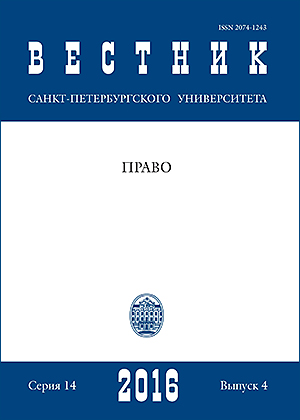Legal nature of the EU open method of coordination in the sphere of social rights
DOI:
https://doi.org/10.21638/11701/spbu14.2016.403Abstract
The article analyzes the legal phenomenon of the Open Method of Coordination. The history of the emergence of coordination methods, prerequisites for the development of a new regulation, as well as fundamental differences between the new regulation and the old ones are defined. The author has also defined the scope of public relations to be regulated by methods of coordination to promote their better efficiency compared with traditional methods of legal regulation. The greatest attention is paid to the definition of the legal nature of the Open Method of Coordination and its differentiation from similar legal concepts, such as “soft law” and the Community method. Along the way, the article proposes a definition of EU soft law corresponding to modern realities. Also a great amount of scientific works of foreign researchers are reflected and critically evaluated. The basic function and purpose of the OMC, the coordination process with the participation of social actors, the EU institutions and Member States, is also described. At the end of the article the main criteria of distinguishing between the Open Method of Coordination and soft law are highlighted. Refs 21.
Keywords:
Open Method of Coordination, EU social law, , the new regulation, the “gap” theory, soft law
Downloads
References
Downloads
Published
How to Cite
Issue
Section
License
Articles of "Vestnik of Saint Petersburg University. Law" are open access distributed under the terms of the License Agreement with Saint Petersburg State University, which permits to the authors unrestricted distribution and self-archiving free of charge.






